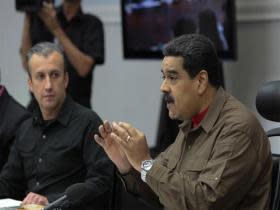Petro: What is Venezuela's new bitcoin alternative and why is it so controversial?

Venezuela has developed a brand new cryptocurrency, called petro.
The government of the crisis-hit country says it was created in order to help overcome financial sanctions imposed by the US and the EU.
However, petro is considered to be illegal by opposition leaders in Venezuela, and there are also concerns that anyone who buys into it could quickly lose their investment.
The Venezuelan government is officially launching the pre-sale of the cryptocurrency today.
Each petro token will be backed by one barrel of oil, it says.
The entire circulation of 100 million petro tokens will be available in its initial coin offering (ICO), with the government expecting the cryptocurrency’s launch to raise $6bn.
“Petro is born and we are going to have a total success for the welfare of Venezuela,” said President Nicolas Maduro, teleSUR reports.
“The largest and most important companies and blockchain in the world are with Venezuela, we are going to sign agreements.”
Venezuela says it expects to attracts investors from Qatar, Turkey, the US and Europe.
It initially won’t be available in to purchase in exchange for the Venezuelan bolivar – which has plummeted in value – but this could become an option in the future.
The Venezuelan government says petro holders will be able to exchange it for goods and services, similar to bitcoin. However, many people consider bitcoin to be more of an asset than a currency, because it can be much harder to spend than traditional money.
“The most important contribution of petro to the cryptoassets’ market and the new digital economy will be the support offered by a sovereign state,” reads the website for petro.
“The Bolivarian Republic of Venezuela guarantees that it will receive petro as a form of payment for national taxes, fees, contributions and public services, taking as a reference the previous day’s Venezuelan oil basket price with a discount. This will ensure that the buyer always has a return value adjusted to the value of his investment.
However, Venezuela’s opposition-led parliament considers petro’s IPO to be “a forward sale of Venezuelan oil,” and “tailor-made for corruption”.
There are also fears that the creation of petro is little more than a desperate bid to raise money, and that it will quickly lose much of its value, leaving investors out of pocket.
Read more
Venezuela halts air and sea traffic with three neighbouring countries
That fear is what led to China banning ICOs last year, in order to stop people from falling prey to financial scams, at a time when mainstream interest in digital currencies was skyrocketing.
“During the last 4 years Venezuela has experienced the biggest financial crisis in its history, a situation that has resulted in a devaluation of its national currency, the bolivar,” the petro website says.
“The petro will be the foundation of a policy to promote development, infrastructure and training of young people in electronic mining, coding, cryptography, network security and economics 4.0, that will enable the exploitation of Venezuela and other developing countries’ most valuable assets in a new world of transparent, deconcentrated and manipulation-free markets, all thanks to technology.”
We’ve teamed up with cryptocurrency trading platform eToro. Click here to get the latest Bitcoin rates and start trading. Cryptocurrencies are a highly volatile unregulated investment product. No EU investor protection. 75% of retail investor accounts lose money when trading CFDs.
Read more
Read more Venezuela halts air and sea traffic with three neighbouring countries

 Yahoo News
Yahoo News 
